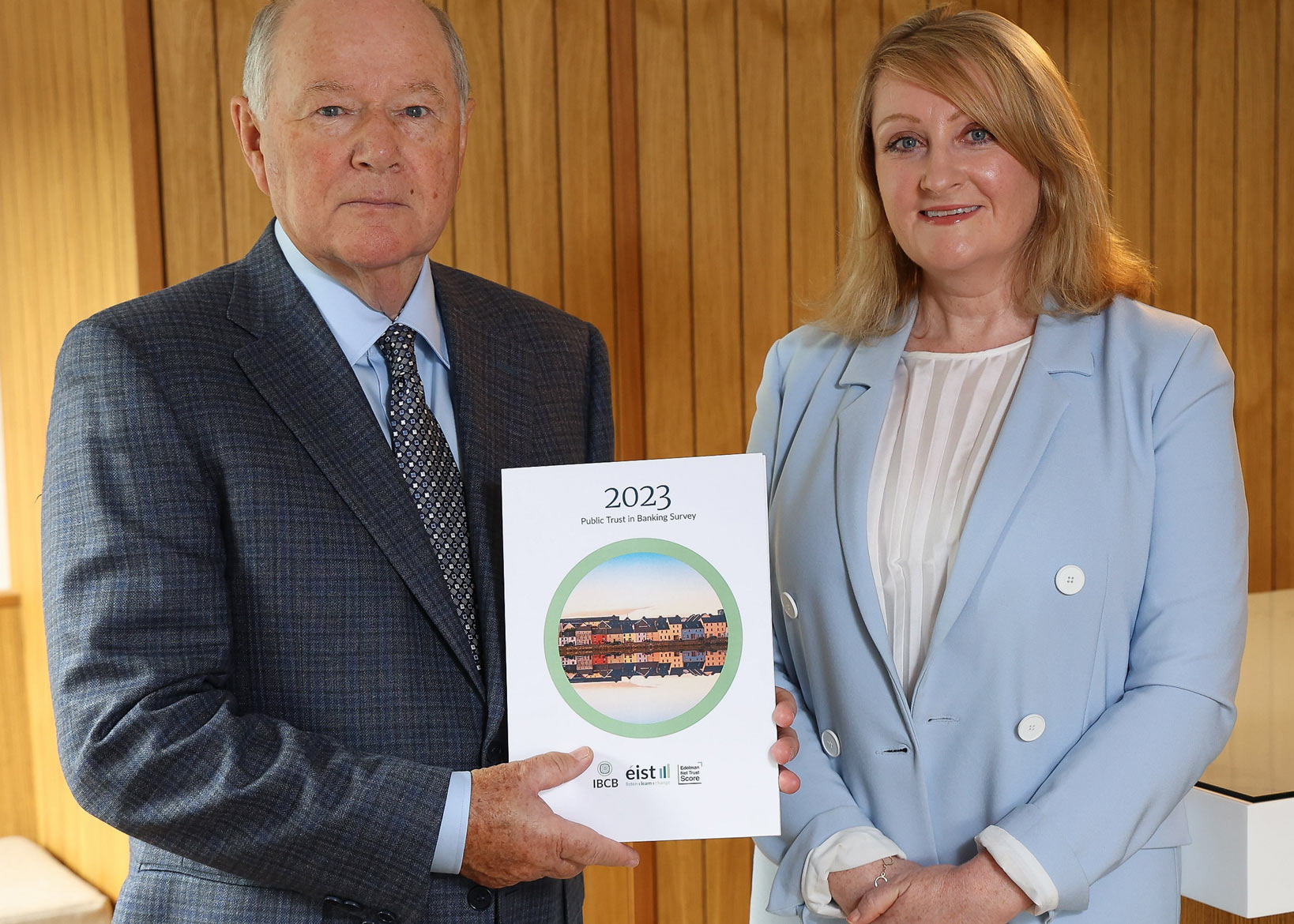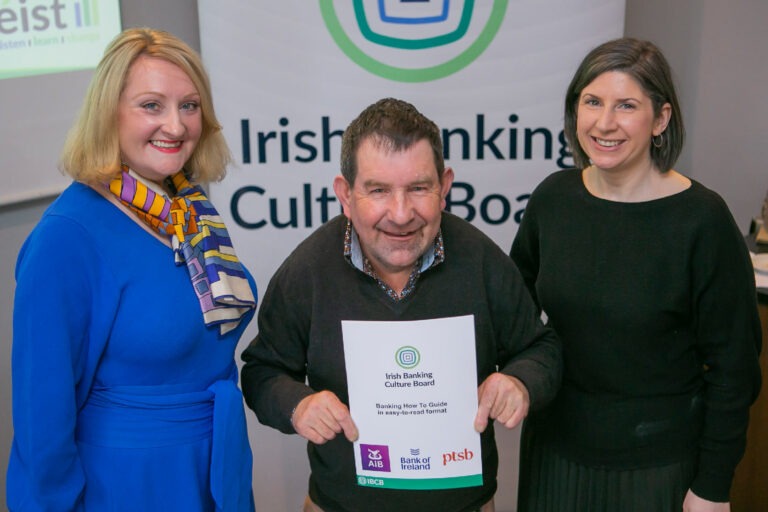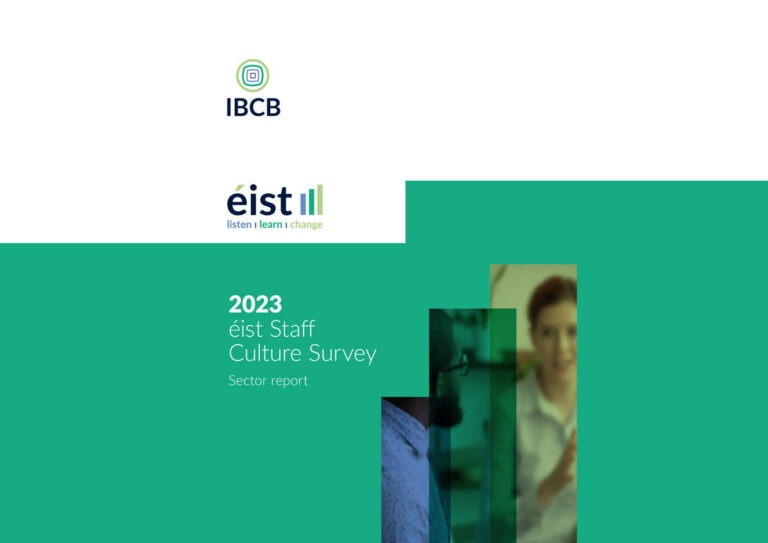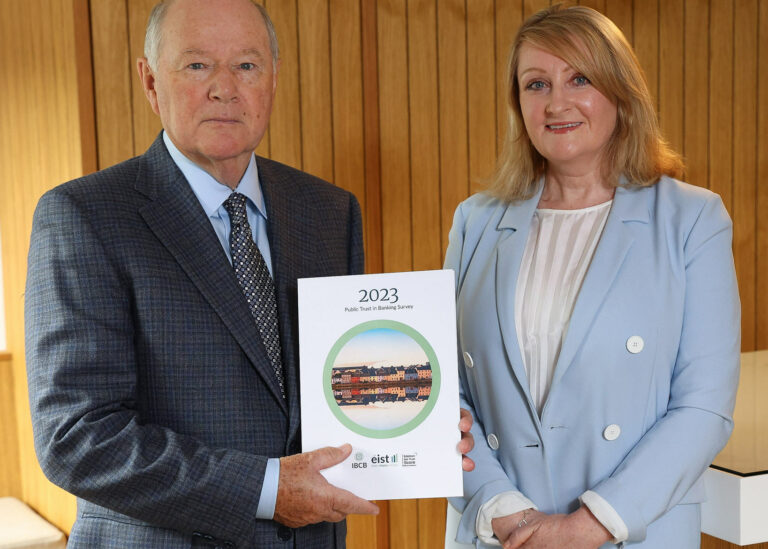Purpose emerges as a significant driver of trust in banks.
17 July 2023: The Irish Banking Culture Board (IBCB) today launched its 2023 éist report; an annual survey measuring public sentiment towards the five retail banks operating in Ireland. The report reveals that while banking remains in a state of flux in Ireland, the slow recovery of public trust in the sector continues.
Over the last three years of the éist survey, the research demonstrates that people make a distinction between their relationship with their local bank branch, individual banks, and their perception of the wider sector.
The 2023 survey found that trust in the banking sector among the general population has improved by 10 points when compared to 2022, driven by results in purpose, ability, and competence, albeit remaining in a negative domain at -15. Trust among respondents from the SME sector remains ahead of the public and improves again this year by 2 points to -5.
Trust in bank branches is significantly higher than the collective industry – demonstrating that proximity impacts trust positively. The éist research was carried out in early 2023 against a backdrop of the departure of two of the five retail banks and the issues this gave rise to for customers, such as switching and branch closures. The survey results highlight that the impact of two of these banks leaving the market has understandably significantly impacted perceptions of trust and as a result, the wider trust score for all IBCB member banks is slightly lower than the collective industry.
This year’s survey has captured the emergence of purpose as a significant driver of trust amongst the general population, which is encouraging, and provides a foundation for further improvement in trust levels in the sector via continued support for local communities, customers in vulnerable positions and financial awareness.
People’s relationship with their local branch, as in previous years, remains the area where trust in banks is strongest. Protecting local presence while seeking to replicate that relationship across other delivery channels will serve the interests of both customers and banks well into the future.
Speaking about the éist 2023 survey results, CEO of the IBCB, Marion Kelly, said: “Gradual progress is being made. The challenge is to accelerate the pace of that progress. While all member banks of the IBCB have been working hard to restore trust, this year’s éist research reflects some understandable negative public sentiment on the departure of two retail banks from the market. Building and maintaining trust between the banks and their customers, as the market evolves, remains crucial. Both the IBCB and its member banks are committed to that objective.”
Economic and mainstream media coverage over the last year has been dominated by issues around inflation, energy price increases and the rising cost of living. Mortgage interest rates became central to the economic narrative, and reports on the large governmental budgetary surplus, a product of bumper corporation tax profits, while significant, came after the survey period. Collectively, these events are the prism through which the research outcomes could be viewed and likely informed the thinking of respondents. Against that backdrop, the éist 2023 findings are encouraging overall, showing slowly increasing trust levels, and providing clarity on the challenges that remain for banks in rebuilding trust with the public.
Marion Kelly added: “Listening to and acting on public sentiment about the banking sector is a commitment of the IBCB and is crucial to addressing culture and turning the dial on trust, which is why our independent ‘éist’ survey, the Irish word for listen, is key. This third iteration of the éist research, as with previous iterations, informs IBCB’s annual work programme.”
Éist 2023 Key Findings:
Top Drivers of Trust
- The top driver of trust this year centred on purpose and an acknowledgement that banks care about the impact of their activities on society and the environment, through initiatives focussed on financial awareness and literacy and support for customers in a vulnerable position.
- 51% see evidence of banks as being a positive force in their community and 52% see evidence that banks support good causes across society. This supports the assertion that the purpose driven work of the banks and the IBCB, amongst others, is influencing people’s perception of the sector and provides an opportunity to continue to earn increased trust in the sector.
- The research also shows that banks are expected to make a positive contribution to the economy and, specifically, to be a positive force in the daily financial lives of their customers. The public feel the banks could do more to support them in dealing with the impact of issues like inflation and the cost of living, with 64% saying they do not do enough.
Relationship with Banks
- The éist survey measures overall levels of trust in the wider banking sector, and separately in the named IBCB member banks, as well as assessing levels of trust people have in their local branch. In the last three years of the survey, the research demonstrates that people make a distinction between their relationship with their local bank branch and their perception of the wider sector. éist 2023 finds that trust in the local bank branch continues to increase, with trust levels in the sector going from a -2 score in 2022 to +9 this year amongst the general population.
- People’s engagement with banks digital services remains high, with 81% of respondents saying they use digital banking services either ‘Frequently’ or ‘Very Frequently’. The trust relationship people have with local branches will be one the banks will want to replicate and protect in a digital context where engagement levels are already high.
- Ability, which is a key driver of trust, is also positive as 66% of respondents said they trust banks to handle their money safely and competently. This is significant and demonstrates the recovery of confidence in the competence of banks to act as responsible curators of people’s finances and to protect them against the increasing levels of fraud and financial crime.
Switching Banks
- The switching issue dominated the financial and mainstream news agenda in the past year and was characterised initially by fear and uncertainty. That news agenda gradually abated as organisations like the Banking and Payments Federation Ireland, the banks, the Central Bank of Ireland, and the IBCB communicated the switching process and the importance for customers to act. The survey findings on the issue found that, ultimately, only 16% of those surveyed said their trust levels were undermined by the switching process, while 37% of those who were required to switch banks said they felt supported by their new bank.
- 39% said they found the switching process easier than expected. Consistent and clear communications from the banks and the support they showed to their customers meant that the switching process was ultimately managed successfully. In this context, the commitment of all five retail banks to adhering to the IBCB’s General Principles for Change throughout the switching process is commended.
Speaking about today’s survey results, Chairperson of the IBCB, Mr. Justice John Hedigan, added: “There is no fast, easy fix when it comes to cultural change. Only change that comes from within the sector can be authentic and sustainable. When viewed over the last three years the éist findings reveal that sentiment towards the banking is slowly improving even against the backdrop of significant change and challenge in the sector.
Change is now a constant in banking and that is likely to be the case into the medium and long term. Regardless of how the sector evolves, creating and maintaining a culture where the interests of customers come first must remain central to the work of our retail banks. Progress is being made.”





